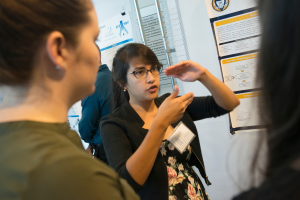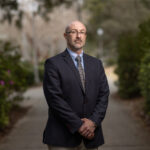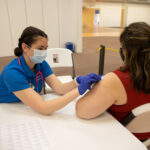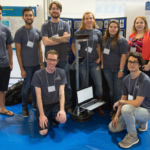Summer Research Symposium Highlights Student Projects
Pensacola – The Hal Marcus College of Science and Engineering Summer Undergraduate Research Program is designed to expose undergraduate students to advanced research in their field of study. The selected students spend 250 hours or more working on a research project in their program of study and under close supervision of a faculty mentor.

About 150 people gathered in the college of science and engineering building for the second annual symposium Aug. 5, at which the summer program culminated. About 50 students presented 44 posters highlighting their summer projects.
As family, friends, faculty and donors discussed the posters, many students reflected on the general knowledge they gained this summer while working on the projects.
“Research is such a new experience. You have your professor helping you, but you are pretty much on your own trying to discover something new” said Chau Tran, a junior studying biochemistry.
Constance Smylie, a sophomore also majoring in biochemistry, agreed with Tran and added, “I like research because it is hands-on and you get to apply everything you learned in the classroom.”
Tran and Smylie worked on a project called “Crystallization of Precursors to Gold-Copper Nanoparticles.” Their mentor was Timothy Royappa in the chemistry department.
“Basically what we were doing is looking for a precursor to a nanoparticle using gold and copper,” Tran said.
Other students talked about the future benefits they expect to reap after devoting a summer to their project.

“I learned that it’s OK in research if things don’t always go the way you planned,” said Amy Brower, a senior majoring in marine biology. “I’m glad I had obstacles because I got to figure out the problems with the guidance of my professor. So, if I run into problems in the future when I’m doing my own research, I’ll have some idea of how to solve them.”
Brower was researching the presence of the mooneye fish in the Mobile River Basin using environmental DNA testing under the supervision of Alexis Janosik, assistant professor in the department of biology.
Students also talked about specific knowledge they gained as they worked on their projects.
“I didn’t know the computer program at all before this summer,” Nicholas Dunn said. “But with the help of both of my mentors, Jia Liu and Lei Hsin Kuo, I was able to learn it and go beyond what I imagined I could do with it.”
Dunn is a junior majoring in math who used the Matlab program in his research on a project titled “Numerical Solvers for Ordinary and Partial Differential Equations.”
Spencer Lash, a senior in electrical engineering worked on a robotics project with Oscar Chuy, an assistant professor of engineering.
“It was hard because there were electrical engineering, and robotic theories that I had to learn because I didn’t know them yet, but it was also fun because you are potentially doing something that no one has ever done before,” Spencer Lash said.
Allison Schwartz, director of the UWF Office of Undergraduate Research, was pleased with the results of this year’s summer symposium.
“I have been out there talking to students, and I think they have done an outstanding job of conveying what they learned, not only with the posters, but as they shared their findings aloud. They were especially good at making the material understandable to people outside the science discipline, which is a very complicated and important thing to accomplish.”



